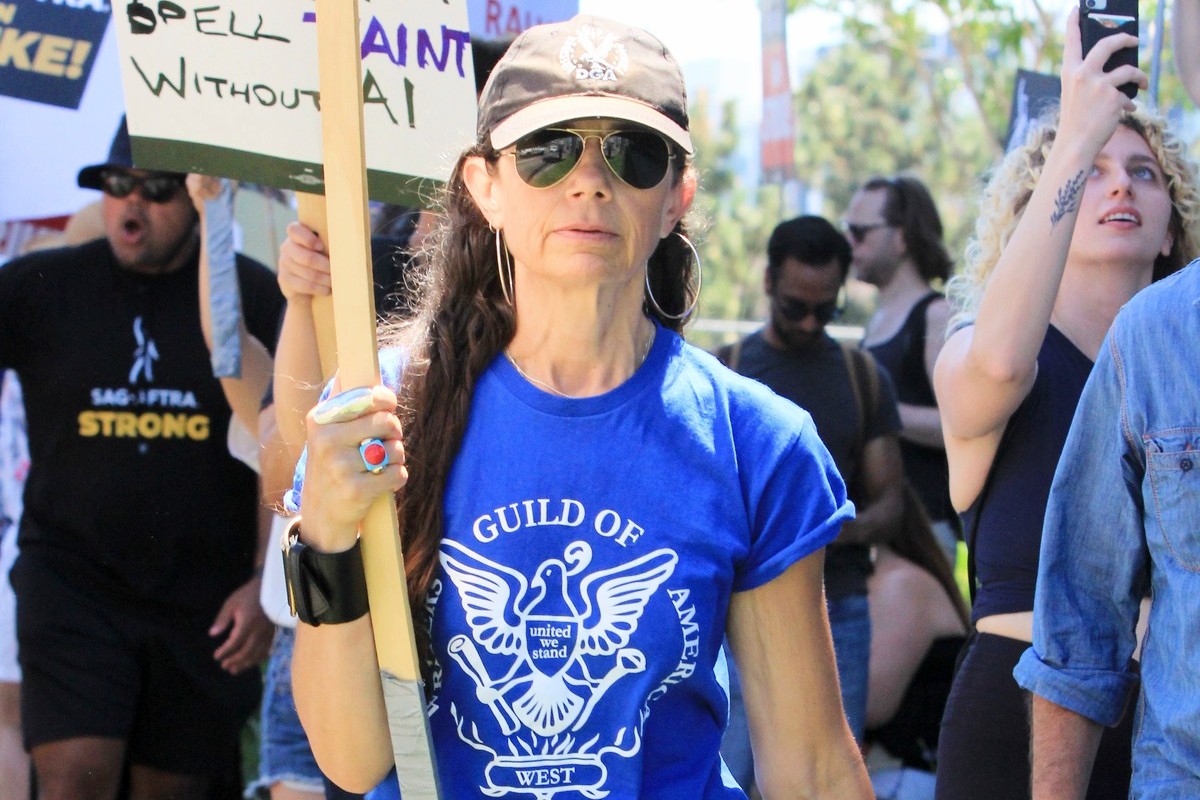The SAG-AFTRA strike concluded on November 9 after the labor union reached a tentative agreement with the AMPTP. However, Justine Bateman still has concerns over this agreement, particularly regarding the AMPTP’s language regarding artificial intelligence.
Bateman is an actress, writer, director, and producer who has long been a vocal supporter of the WGA and SAG-AFTRA, even serving for a time on SAG’s board of directors. During this year’s dual strikes, Bateman was a vocal critic of the studios’ plans for AI. SAG-AFTRA shared many of her concerns. However, it was one of the most contentious subjects for the labor union and AMPTP to negotiate. Studios’ ideas for AI were very concerning and wildly different from SAG-AFTRA’s demands for safeguards around the technology.
The AMPTP started out proposing that it scan actors’ likenesses in exchange for one day of pay and then own that likeness—and the right to recreate it with AI—in perpetuity. Even when the “final” proposal arrived just days before the strike ended, it still contained concerning language that indicated the studios wanted to own the likenesses of deceased actors in perpetuity. Fortunately, SAG-AFTRA ignored the studios’ claims that this was the final offer and sent back a counter-proposal to deal with the AI. When it was announced soon after that a tentative deal had been reached, many assumed the AI concerns had been addressed.
Although the agreement is not yet public, Bateman has allegedly read it and believes the AI language is still a problem.
Justine Bateman alerts actors to concerning AI language in SAG-AFTRA agreement
Bateman took to X, formerly Twitter, on November 11, indicating that she wanted actors to be aware of the concerning language in the “AI portion of the tentative SAG agreement.” She decided to compile all of the troubling language she read in a thread. Since the agreement isn’t public, it’s difficult to verify the context and if this is the language included in the tentative agreement. However, what Bateman alleges is fairly concerning.
The two primary concerns Bateman touches on are how studios will use “digital doubles” and “AI Objects.” Digital doubles are the AI recreations studios want to make from an actor’s likeness. Bateman is concerned over how transparent studios will be when using these digital doubles. While studios need consent to use digital doubles in a movie, the agreement suggests they don’t need consent to change the digital double. According to Bateman, this means the studio could change the digital doubles’ clothes, makeup, and even physical position without consent. It also means that actors’ digital doubles could be used in a way they didn’t agree to, similar to how The Flash changed Nicolas Cage’s cameo without consent or notification.
Bateman is also concerned about some ambiguous language suggesting actors won’t be paid if their digital doubles are used for a sequel after being created for the original film. Meanwhile, when actors create a digital double privately or for a specific film, it’s an “independently created digital replica (ICDR).” While studios need consent to use an ICDR, there’s no minimum compensation they must provide. There are also loopholes, such as parodies, biographical work, and historical work, that do not require consent or compensation for ICDRs. The agreement also allegedly states that studios can use a background actor’s digital replica as a principal performer in the film as long as they compensate the actor. However, the actor won’t experience being a principal actor as just their likeness will be used.
The biggest concern Bateman had was that the agreement allows studios to use “AI Objects resembling humans.” This means that studios could potentially create shows and movies entirely using AI instead of human actors. Bateman sees this as the beginning of actors being wholly replaced by AI. Additionally, she expressed concern over how human actors will now have to compete against digital doubles and AI Objects, vastly changing the nature of auditions and competition in Hollywood.
It remains to be seen if SAG-AFTRA will respond to Bateman’s concerns or if the concerns will persist after the agreement is publicized. However, given the AMPTP’s past AI proposals and their responses to the strikes, it’s not unreasonable to be wary of studios potentially planning to turn around and replace actors with AI. One would also hope that SAG-AFTRA wouldn’t agree to any provisions that could make that plan easier to carry out.
(featured image: MEGA / Getty Images)









Published: Nov 13, 2023 01:53 pm